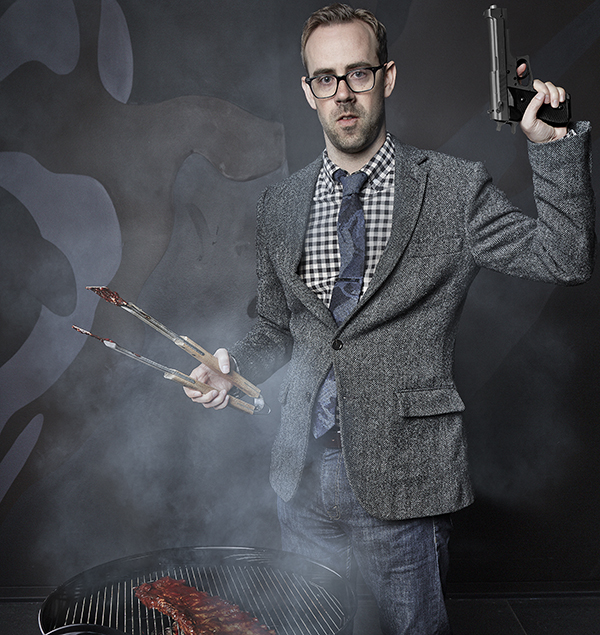Sort of. In the May issue of the redesigned D Magazine, former online arts editor turned managing editor Liz Johnstone conducted a Q&A with Lee Trull. Trull is directing the main stage production of Kitchen Dog Theater’s New Works Festival—a play called Barbecue Apocalypse, which opens on May 23 and runs through June 21. Get tickets here.
In 2003, Lee Trull had two jobs: construction worker, helping tear down the Dallas Children’s Theater’s old Oak Lawn location, and actor, in the DCT’s production of Miss Nelson Is Back. That’s where he met a writer named Matt Lyle, who would eventually take his talents to Chicago. Eleven years later, Trull, now the Dallas Theater Center’s director of new play development, is directing the world premiere of Lyle’s play Barbecue Apocalypse, which will run at Kitchen Dog Theater as part of the annual New Works Festival. It’s Trull’s first time at the helm of the festival’s main stage production.
Tell me about the show.
The first act is set in some sort of not-quite suburbia, but definitely a house with a backyard and a deck. Two friends are inviting a group of friends over, two other couples, for a barbecue. And they’re a little insecure about their house. Two of the friends are what Matt calls a “yupster”—yuppie foodie types who also wear trendy clothes and have an interesting house. They’re also insecure about the male protagonist’s old buddy, who is this alpha male bringing his hot young girlfriend, while our male protagonist doesn’t even know how to light the grill. And then something happens during intermission. Everything goes off the grid, there’s a nuclear meltdown—something. We don’t know what it is. And the second act is the exact same couples coming over a year later, post-apocalypse, for another barbecue. It’s very funny.
How did you come on board to direct?
I’ve been directing readings at Kitchen Dog for about five or six consecutive years as part of their New Works Festival. I have been reading plays as part of the artistic company. We have to read as many as we can grab of the 300-plus submissions they get every year and rank them and pass them on through. I’d been advocating for a while that I would like to direct the main stage. So they decided in January—it took them awhile—to go with Matt’s play. Because it’s so funny, because he was such a local guy. The themes are something they felt like the city and their subscribers would be into. And they thought I would be a good fit. So here I am. I got the gig.
Tell me a secret about the play.
It plays on two different things. One is the insecurities of being a modern man. What you’re able to do, what you’re able to buy and provide. What you’re able to kill and build and turn on. And then I think it also, at the exact same time, plays on the insecurities of being a modern woman. Who you’re able to attract, how you’re able to put things together and see things, what level of taste you have. So I think, honestly, it is a date show for that reason. Some of that may be uncomfortable, but yeah.
What’s the difference between directing a new work, like Barbecue Apocalypse, and what you do at the Dallas Theater Center?
At the Theater Center, I serve as a producer. Some of that means flying to New York and meeting with cool playwrights and great directors and sexy actors and having an amazing time. But mostly it means getting yelled at and doing really boring everyday office stuff. And it means, frankly, caring very deeply about something that you have no control over. You have no chance to really effect any sort of change during it. But you’re losing sleep, you’re losing hair, you’re spending your own money to take people out to dinner, you’re working tirelessly to get it up and going.
What is it about new work like this that excites you?
It’s a very dangerous, touchy thing to have a play go up for the first time. In the development stage, you can keep something going for a while because the promise is always there. But when it actually comes to a full production, I think it’s very key that the first one has life and energy. That it’s connected to what they’re trying to say, and that their voice sounds like them. And I think we owe it to the young artists who are trying to make theater come alive, who are trying to keep theater growing and changing and expanding—I think they need interpreters. I think they need believers and people to support them. And I think that’s what producers and artists like [DTC Artistic Director] Kevin Moriarty, like myself, like my friends all around the country, like Kitchen Dog Theater, like Undermain Theatre—I think that’s our No. 1 job.





